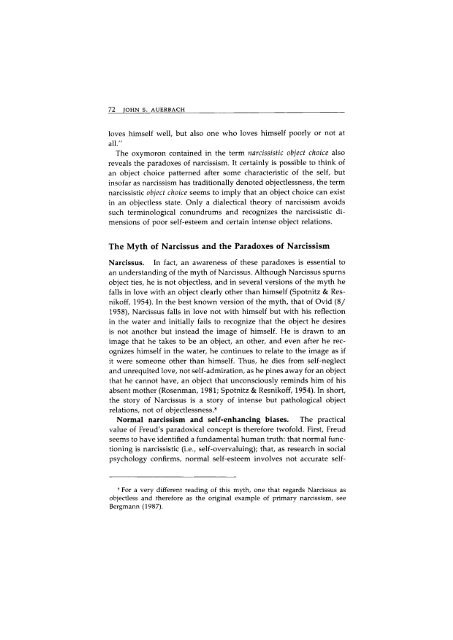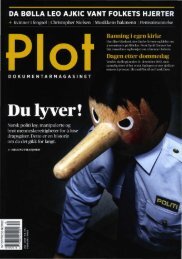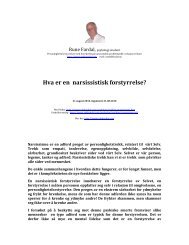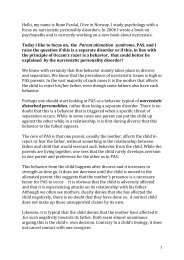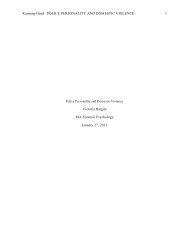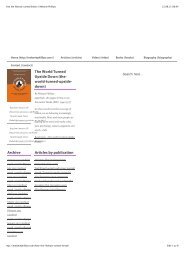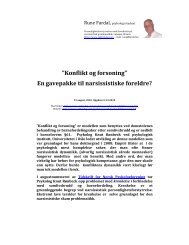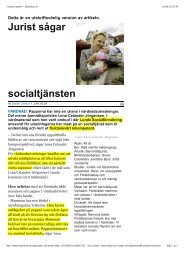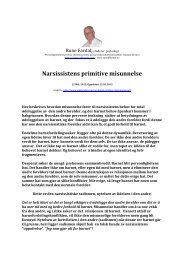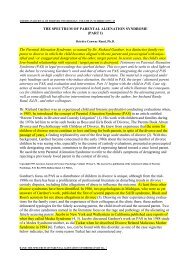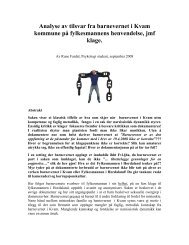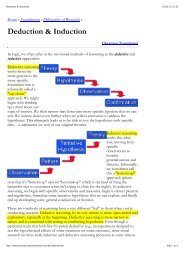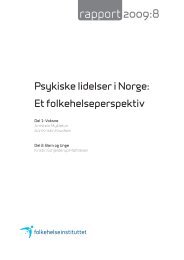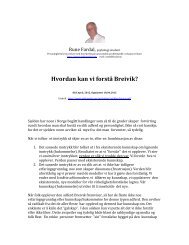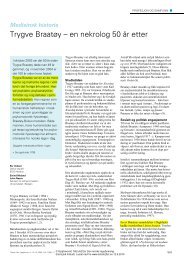The origins of narcissism and narcissistic personality disorder a
The origins of narcissism and narcissistic personality disorder a
The origins of narcissism and narcissistic personality disorder a
You also want an ePaper? Increase the reach of your titles
YUMPU automatically turns print PDFs into web optimized ePapers that Google loves.
72 JOHN S. AUERBACH<br />
loves himself well, but also one who loves himself poorly or not at<br />
all.”<br />
<strong>The</strong> oxymoron contained in the term <strong>narcissistic</strong> object choice also<br />
reveals the paradoxes <strong>of</strong> <strong>narcissism</strong>. It certainly is possible to think <strong>of</strong><br />
an object choice patterned after some characteristic <strong>of</strong> the self, but<br />
ins<strong>of</strong>ar as <strong>narcissism</strong> has traditionally denoted objectlessness, the term<br />
<strong>narcissistic</strong> object choice seems to imply that an object choice can exist<br />
in an objectless state. Only a dialectical theory <strong>of</strong> <strong>narcissism</strong> avoids<br />
such terminological conundrums <strong>and</strong> recognizes the <strong>narcissistic</strong> dimensions<br />
<strong>of</strong> poor self-esteem <strong>and</strong> certain intense object relations.<br />
<strong>The</strong> Myth <strong>of</strong> Narcissus <strong>and</strong> the Paradoxes <strong>of</strong> Narcissism<br />
Narcissus. In fact, an awareness <strong>of</strong> these paradoxes is essential to<br />
an underst<strong>and</strong>ing <strong>of</strong> the myth <strong>of</strong> Narcissus. Although Narcissus spurns<br />
object ties, he is not objectless, <strong>and</strong> in several versions <strong>of</strong> the myth he<br />
falls in love with an object clearly other than himself (Spotnitz & Resnik<strong>of</strong>f,<br />
1954). In the best known version <strong>of</strong> the myth, that <strong>of</strong> Ovid (8/<br />
1958), Narcissus falls in love not with himself but with his reflection<br />
in the water <strong>and</strong> initially fails to recognize that the object he desires<br />
is not another but instead the image <strong>of</strong> himself. He is drawn to an<br />
image that he takes to be an object, an other, <strong>and</strong> even after he recognizes<br />
himself in the water, he continues to relate to the image as if<br />
it were someone other than himself. Thus, he dies from self-neglect<br />
<strong>and</strong> unrequited love, not self-admiration, as he pines away for an object<br />
that he cannot have, an object that unconsciously reminds him <strong>of</strong> his<br />
absent mother (Rosenman, 1981; Spotnitz & Resnik<strong>of</strong>f, 1954). In short,<br />
the story <strong>of</strong> Narcissus is a story <strong>of</strong> intense but pathological object<br />
relations, not <strong>of</strong> objectlessness.8<br />
Normal <strong>narcissism</strong> <strong>and</strong> self-enhancing biases. <strong>The</strong> practical<br />
value <strong>of</strong> Freud’s paradoxical concept is therefore tw<strong>of</strong>old. First, Freud<br />
seems to have identified a fundamental human truth: that normal functioning<br />
is <strong>narcissistic</strong> (i.e., self-overvaluing); that, as research in social<br />
psychology confirms, normal self-esteem involves not accurate self-<br />
For a very different reading <strong>of</strong> this myth, one that regards Narcissus as<br />
objectless <strong>and</strong> therefore as the original example <strong>of</strong> primary <strong>narcissism</strong>, see<br />
Bergmann (1987).


